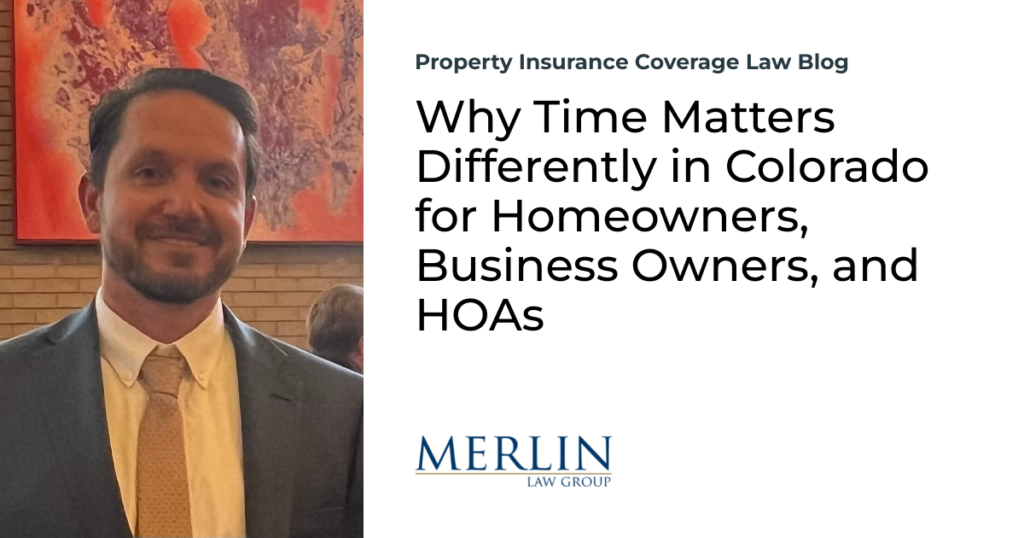Why Time Matters Differently in Colorado for Homeowners, Business Owners, and HOAs

In Colorado, a homeowner’s time limit for filing a breach of contract lawsuit against an insurance company for an unpaid or underpaid claim can differ from the time limits imposed on business owners and homeowners associations.
Contractual Breach of Insurance Policy:
Under Colorado Revised Statute § 13-80-101(1), a lawsuit based on a breach of contract must be filed within three years after the cause of action accrues. However, insurers have the ability to contractually reduce this period. Notably, they can shorten it to as brief as six months from the date of loss.1 Commonly, insurance carriers reduce this period to one to two years.
In 2014, the Colorado State Legislature enacted Colorado Revised Statute § 10–4–110.8(12)(a) to safeguard homeowners. This provision prevents insurance carriers from diminishing the three-year statute of limitations period for claims made by homeowners. As a result, insurers are prohibited from issuing or renewing policies that require homeowners to sue within a timeframe shorter than the legally prescribed statute of limitations.
(12)(a) Notwithstanding any provision of a homeowner’s insurance policy that requires the policyholder to file suit against the insurer, in the case of any dispute, within a period of time that is shorter than required by the applicable statute of limitations provided by law, a homeowner may file such a suit within the period of time allowed by the applicable statute of limitations . . .
(b) On and after January 1, 2014, an insurer shall not issue or renew a homeowner’s insurance policy that requires the policyholder to file suit against the insurer, in the case of any dispute, within a period of time that is shorter than required by the applicable statute of limitations provided by law.
In the context of homeowners associations, it appears that individuals who own townhomes or condominiums may not be classified as “homeowners” under § 10–4–110.8(12)(a). While there is no controlling law on this issue, at least three Colorado Federal District trial courts have held that a commercial entity holding a “Business Owner’s Policy” for townhomes or condominiums does not fall within the scope of a “homeowner” as contemplated by the statute.2 The courts reasoned that the statute’s language specifically targets “homeowner’s insurance policies” and makes no provision for commercial or business policies, even if they cover residential structures like townhomes or condominiums. In light of this statutory interpretation, those trial courts concluded that Colo. Rev. Stat. § 10–4–110.8(12)(a) was inapplicable to insurance policies held by homeowner’s associations that are essentially commercial in nature.
It is important to note that the timing for the statute of limitations for homeowners, business owners, and HOAs begins from the date of loss, not the date of discovery or the date of reporting.
This is why it is essential to review a certified copy of the policy. Failing to meet key deadlines could jeopardize your claim and available legal remedies.
If you have questions about your claim, please contact our office.
1 Grant Family Farms, Inc. v. Colo. Farm Bureau Mut. Ins. Co., 155 P.3d 537, 538 (Colo. App. 2006); Union Health & Accid. Co. v. Welch, 206 P. 790, 790 (Colo. 1922).
2 Pinewood Townhome Association, Inc. v. Auto Owners Insurance Co., 2017 WL 590294, at *2-3 (D. Colo. Feb. 13, 2017); Brookshire Downs at Heatherridge Condo. Ass’n, Inc. v. Owners Ins. Co., 324 F. Supp. 3d 1201, 1204 (D. Colo. 2018); Steeplechase II Condo. Ass’n, Inc. v. Travelers Indem. Co., No. 17-CV-01273, 2018 WL 6571392, at *3 (D. Colo. Dec. 13, 2018).







